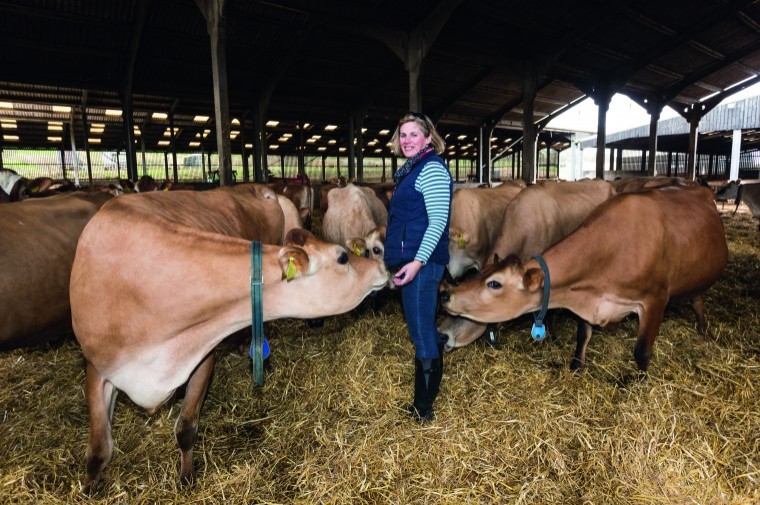Having walked around quite a few fields last week, it would appear that the crops have fared much better than I would have expected bearing in mind the unprecedented amount of rainfall through the winter months.
The clocks have changed and that only means one thing – summer is on its way. Hoorah – warmer weather will be more than welcome and I shall take severe action if anyone dares to say: “It’s too hot”. The crop that appears to have done rather well with all the rain is the Triticali; let’s hope it yields as well.
With the final details regarding Brexit underway, the straw market has begun to pick up. Prices are nowhere near where they were last year, but are increasing day by day. The hay market seems to be moving, albeit slowly. Rumours are circulating that straw could be in short supply later in the year. The grass has started to grow and silaging will soon be here. Wrap has been delivered; the only missing ingredients is the sun. Let’s hope it graces us with its presence soon.
Covid-19 seems to be a challenging virus that would appear to affect us all in one form or another. So many rumors are flying around, and if the truth be known no-one has an answer. Ski resorts are closed and countries are on “lock down”. In Italy all non-essential businesses have been forced to shut. The virus appears to be spreading rather rapidly and no end is in sight.
As I sit to write this article, the children have had both school trips cancelled and no country seems to be unaffected apart from the Seychelles… a nice dream perhaps. Unfortunately, a late-night lambing duty looms ahead. The situation changes day by day and I would imagine that by the time you read this the country may well be on “lock down”. Schools may well have closed early for the Easter break.
I came across an article written in Australia by a scientist entitled vegans face a moral dilemma. In their efforts to protect animal welfare, do vegans run the risk of damaging the planet? He reckons that someone getting their essential minimum amino acid requirements from plant-based foods excretes more climate-damaging materials than the same person getting them from animal products.
Avoiding animal protein means excreting 32g/day more nitrous oxide than people on omnivorous diets.
Soya beans are the only staple crop also considered a protein crop. They are approximately 36% protein when dry and after being soaked overnight and cooked for a couple of hours the protein drops to just 17%. Using animals to improve the efficiency of a plant-led food economy by improving nutritional effectiveness and reducing waste is a very sustainable compromise. The article was certainly food for thought.
Having started to complete our milk buyer’s comprehensive form on our carbon footprint/climate check, I am beginning to lose the will to carry on. Climate change is top of the agenda and in the UK we have reduced emissions per kilo of milk by 24% to an average emission intensity of 1.15kg of co2 per kilo of milk, which is half of the global average. We are supposed to be carbon net zero by 2050.
I understand that farming has to be sustainable to maintain “business competitiveness”. We have been reducing our carbon footprint since 1990 at 1% per annum but this now has to accelerate to 3% per annum or we won’t hit that target of being carbon neutral by 2050. Grumpy seems to think that he won’t be around to witness this. I on the other hand hope that he is still with us.
In the UK we have approximately 1½ million cows, while in India they have around 186 million. I question whether Indian farmers have to fulfil these stringent deadlines for being carbon neutral. If global warming is man-made and if cows contribute to global warming, could someone please inform me how much of a reduction our small percentage of the cow population will make to global warming?
Unfortunately, failure to complete the form will have a financial impact (a reduction in the milk price) and ultimately our buyer could refuse to collect the milk. After much deliberation we have decided to pass it on to the next generation to finish. It must count towards some sort of a degree?
The youth are more au fait with all the political paperwork that needs to be filled out.
Grumpy definitely has become a very grumpy dinosaur over it all. I am sure that many years ago, when cattle passports became the law, there were many older farmers who struggled to come to terms with the fact that they were being dictated to by the government. The only difference now is the parameters have changed rather dramatically. Agriculture, or dairy farming in particular, is one of the only businesses that has its input and output prices mandated. With the BPS on the decline, farmers will have to fulfil the strict criteria to achieve these extra payments, which will mean jumping through lots more paperwork trails in the future.
I wish everyone a happy and successful Easter.




